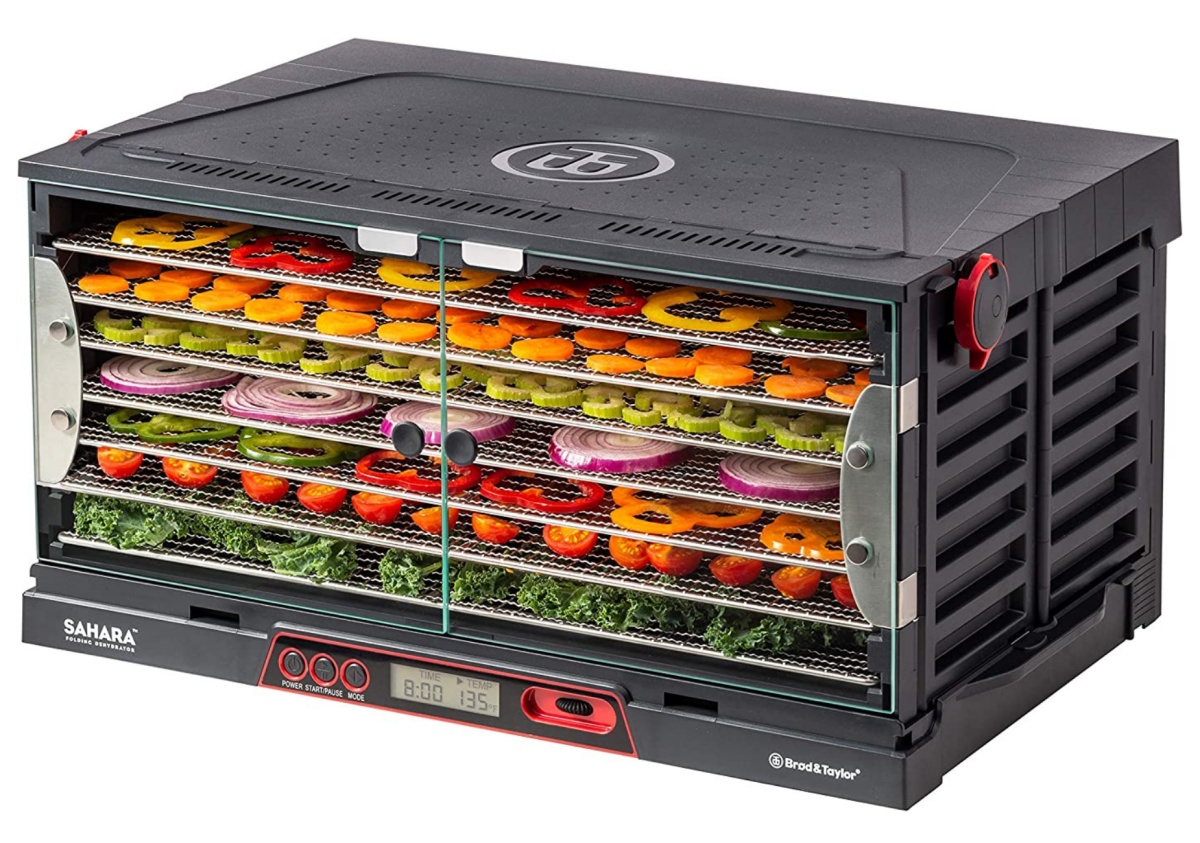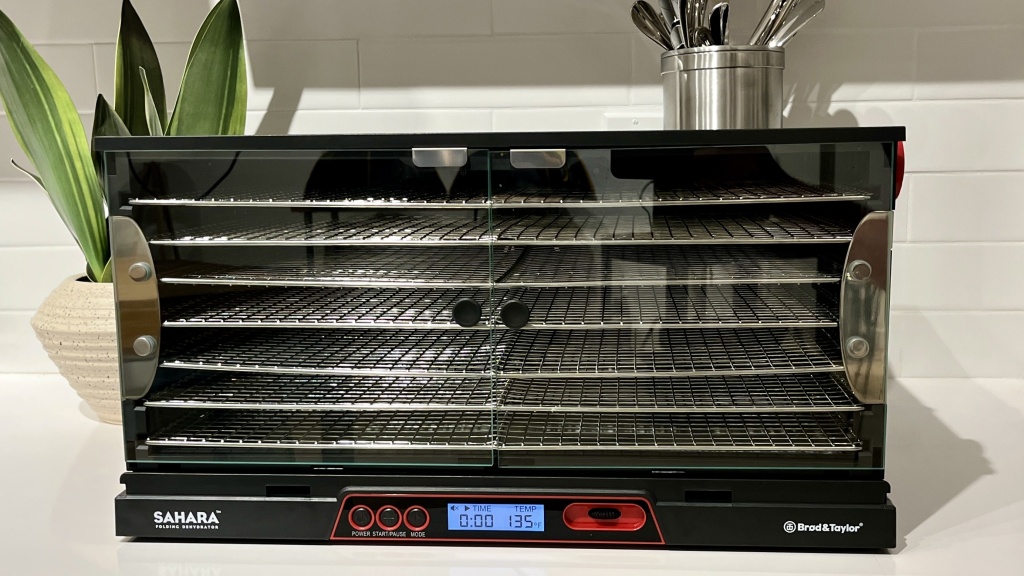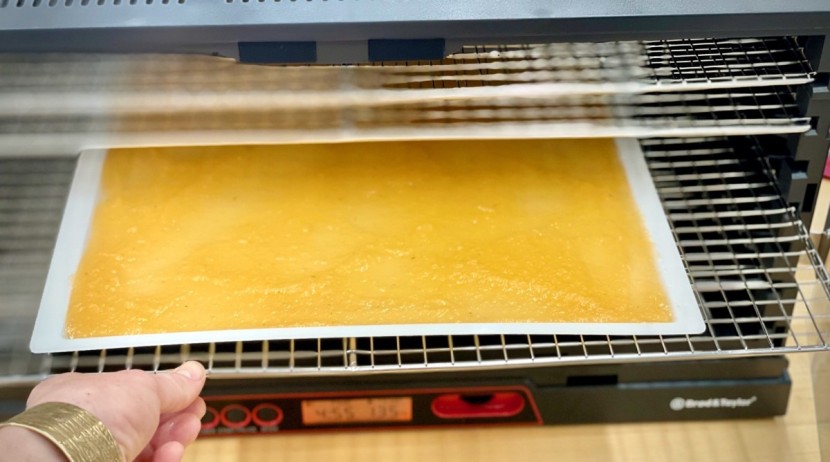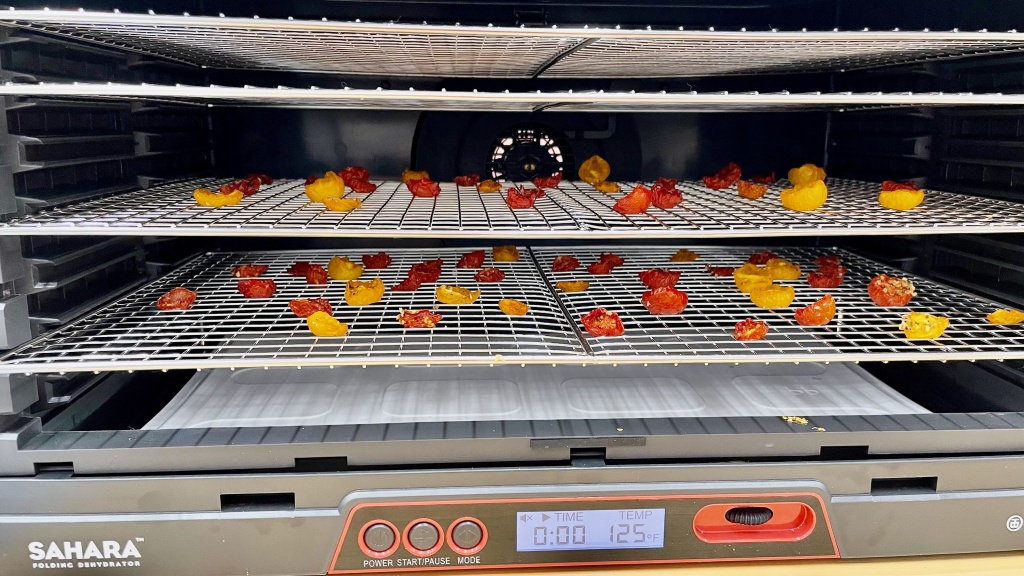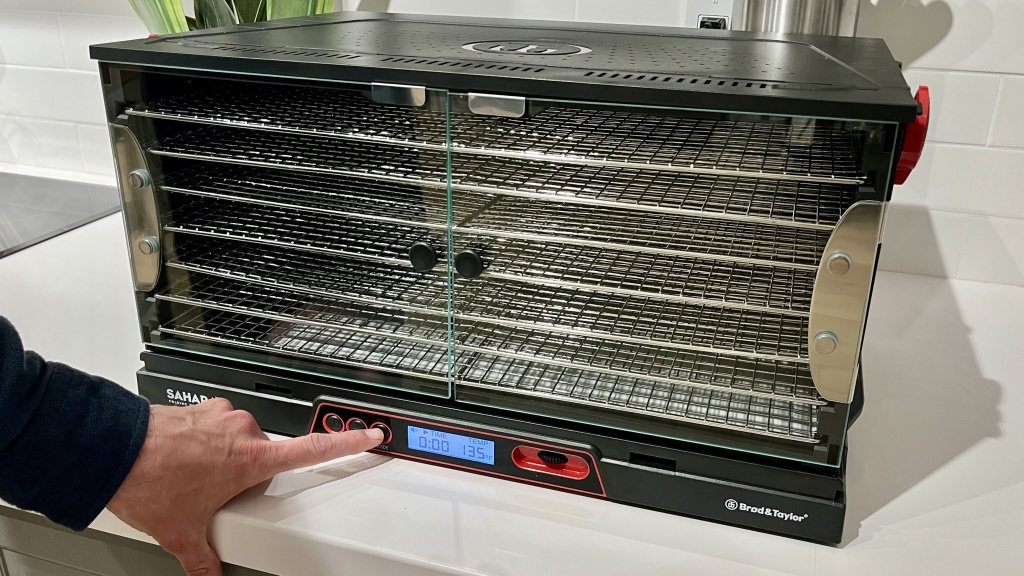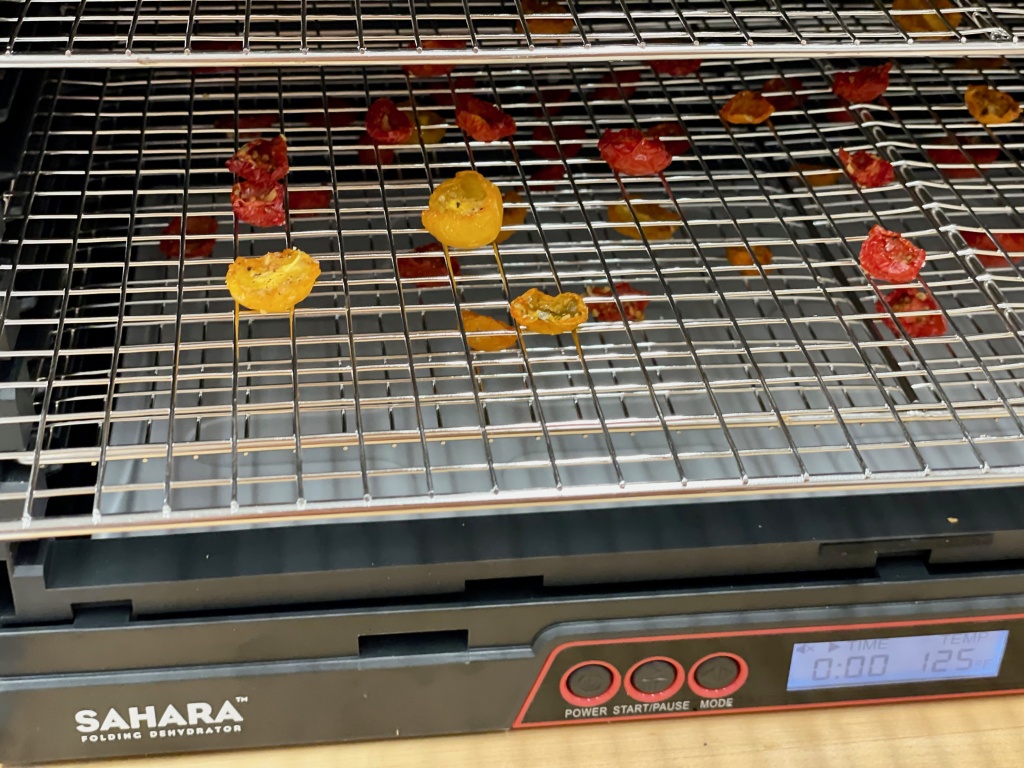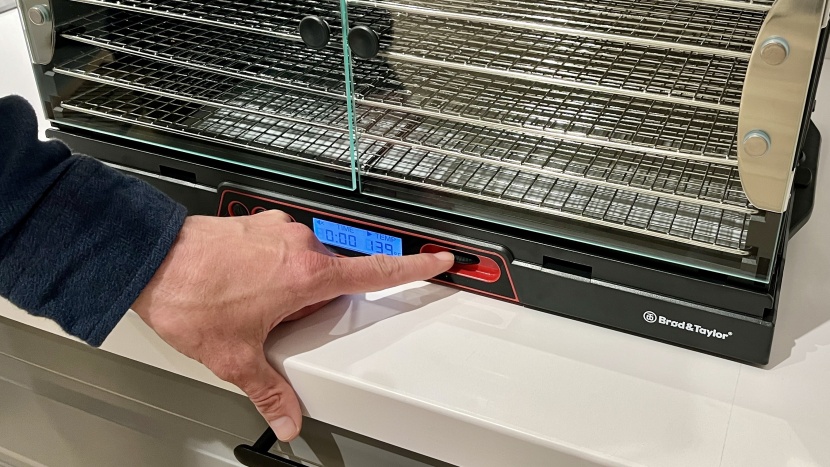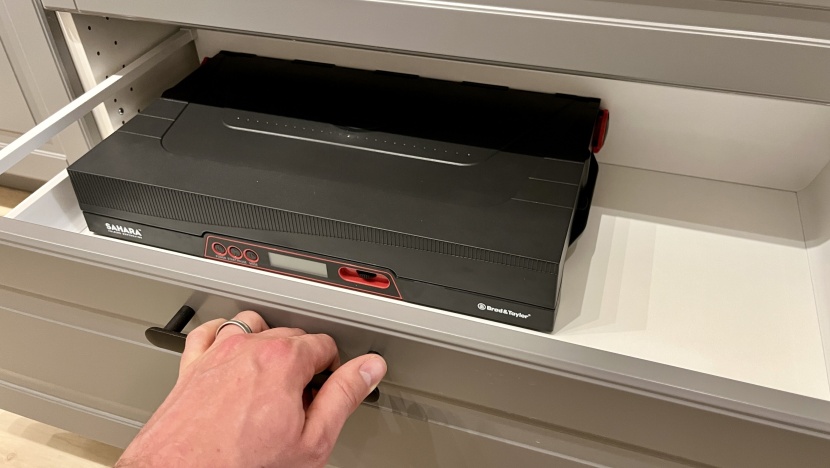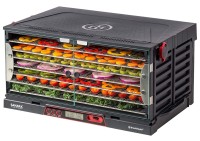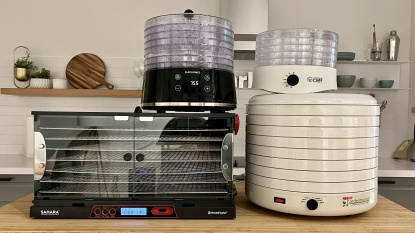Brod & Taylor Sahara Folding Review

Our Verdict
Our Analysis and Test Results
Dehydrating
For the first section of our review, we wanted to see how well each model performed its primary task of slow-cooking food. We ran trials using a variety of foods with various textures, water contents, and thicknesses to see which models worked best for which types of food: we dehydrated jerky, fresh herbs, tomatoes, and fruit leather. We then subjectively inspected each model's dehydrated snacks for dryness inconsistencies and texture uniformity. Finally, we had the in-house GearLab team judge the foods produced by each dehydrator for taste and to let the research team know if there was anything else they noticed about the snacks.
The first food we got after was fruit leather. Although it took the Sahara more than eight hours to dehydrate the food to a satisfactory level, the finished snack was stupendous. Comments from our panel of judges included “Really good, even texture,” "Not too dry," and "Yummy!"
Next, we dried some rosemary and sage. Sadly, the Sahara did not show very impressive results for this task. The herbs were still a bit squishy after the same amount of time and temperature that other models were able to completely dry them. However, the Sahara did earn some redemption when we dried some cherry tomatoes. The tomatoes turned out tasty and delicious, with a mostly uniform texture and consistency. Finally, when we made jerky, the judges thought that it turned out a bit dry and sort of hard. Texture aside, we all agreed that the jerky was very flavorful and that the taste of the marinade was very evident.
Temperature Accuracy
Over the past five years, we have tested thousands and thousands of products at GearLab. More often than you might think, we find that manufacturers' claims in regard to weight, temperatures, power outputs, and durability are wildly inaccurate. An inaccurate temperature setting with a kitchen appliance could mean that you botch a half-dozen recipes and waste tons of food but have no idea what you're doing wrong. For this reason, we like to use the sensors and instruments needed to keep manufacturers honest. For this portion of our review, we compare the temperatures displayed on the user interface of each food dehydrator with their actual measured temperatures.
Using a thermocouple sensor, we checked the temperature of each dehydrator at four different heat settings after fifteen minutes of preheating. Set to 100 degrees, the Sahara showed an actual temperature of 102 degrees. At 115 degrees, the settings and measured temperature were identical. We recorded a measurement of 126 degrees when the temperature was set to 130 degrees. Finally, the actual temperature was only 151 degrees when the device was set to 160 degrees, showing the most significant deviation of any of the four temperature settings. Nine degrees may seem like a lot, but considering that some models were more than twenty degrees off, we think that this difference is totally manageable.
Ease of Cleaning
If you are an expert in the kitchen, it's likely you're an expert at cleaning the kitchen. We've found a large degree of variability in how easy kitchen appliances are to clean. Some can go straight in the dishwasher, some easily rinse in the sink, and some just seem downright impossible to wash. Nobody wants to have an enjoyable time preparing the perfect treat, only to find out that cleaning up is going to be just as much work as the process of cooking. In this section, we look at how difficult it is to clean each food dehydrator. We consider whether or not the trays are dishwasher safe and how hard it is to get into the deepest corners of the device's inner compartment.
The Sahara is one of the easiest food dehydrators to clean that we've seen to date. The metal trays slide out without complication and can be washed in the sink or dishwasher. Below the cooking trays, there is a removable plastic floor tray that makes cleaning up crumbs and drips a breeze. We found little difficulty wiping out the interior of the dehydrator with a cloth. The only reason why we didn't give the Sahara a higher score for this metric is that it requires a tiny bit more time and attention to get every nook and cranny of the interior because of its folding design.
Ease of Use
When it comes to kitchen appliances, how easy they are to operate is all over the board. With some, all you do is plug the device into the wall, and it's on. Others have complicated setup and programming processes, and many are now controlled by smartphone apps and even voice commands. Food dehydrators fall about in the middle of the road as far as complicated appliances go. Some are simple, and some are highly programmable, so ease of use will really depend on which model you choose to purchase.
We would say that the Sahara is about as easy to use as it gets. We love the digital display, and we found the user interface to be exceptionally straightforward and simple. It has a rubber-coated wheel that adjusts both time and temperature. The rest of the various settings can be adjusted with the three buttons just to the left of the wheel. We initially expected the folding and unfolding process to be a bit of a pain, but much to our surprise, it takes a mere matter of seconds to complete the conversion in either direction. If you're looking to run fewer large batches rather than several small batches, the Sahara has an impressive 15 square feet of cooking area divided amongst its seven massive trays.
Value
Although the Sahara is most certainly on the pricey side, it is far from the most expensive dehydrator on the market. With the high price comes impressive performance, and to top it off, it is easily stored out of use until you're ready for your next dehydration marathon.
Conclusion
The Brod & Taylor Sahara Folding is one of our favorite models. It's easy to clean, it's easy to operate, it does a great job, and for the most part, the temperature readings are accurate. On top of its commendable overall performance, it collapses to one-third of its operational size for storage.
| Awards | Best for Storage Space |
|---|---|
| Price | $395 List Check Amazon (on sale!) |
Overall Score  |
|
| Star Rating | |
| Bottom Line | A folding model that takes up minimal storage space but expands to be a full-sized appliance |
| Pros | Impressive storage size, operates quietly, easy to use |
| Cons | Takes time to convert, pricey |
| Rating Categories | Brod & Taylor Sahara... |
| Dehydrating (25%) | |
| Temperature Accuracy (25%) | |
| Ease of Cleaning (25%) | |
| Ease of Use (25%) | |
| Specifications | Brod & Taylor Sahara... |
| Tray Dimensions | 21" x 31" |
| Number of Trays | 7 |
| Temperature Range | 86-165 F |
| Tray Material | Stainless steel |
| Power Consumption | 750W |
| Capacity | 15 sq ft |
| Outside Dimensions | 12.5" x 22" x 3.5" |


